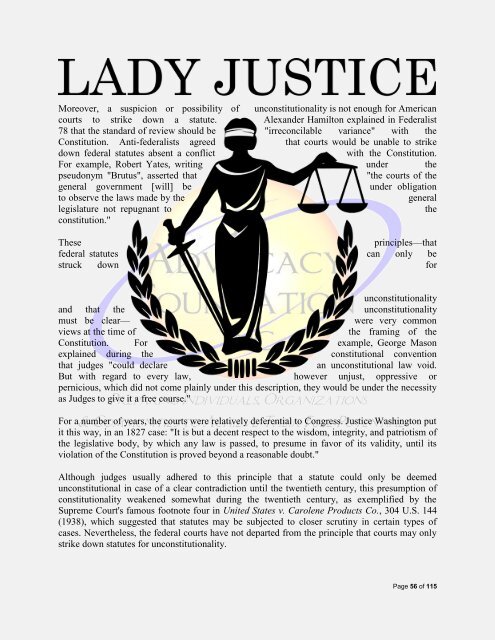Judicial ReEngineering
Judicial ReEngineering
Judicial ReEngineering
You also want an ePaper? Increase the reach of your titles
YUMPU automatically turns print PDFs into web optimized ePapers that Google loves.
Moreover, a suspicion or possibility of unconstitutionality is not enough for American<br />
courts to strike down a statute. Alexander Hamilton explained in Federalist<br />
78 that the standard of review should be "irreconcilable variance" with the<br />
Constitution. Anti-federalists agreed that courts would be unable to strike<br />
down federal statutes absent a conflict<br />
with the Constitution.<br />
For example, Robert Yates, writing under the<br />
pseudonym "Brutus", asserted that<br />
"the courts of the<br />
general government [will] be<br />
under obligation<br />
to observe the laws made by the<br />
general<br />
legislature not repugnant to<br />
the<br />
constitution."<br />
These<br />
principles—that<br />
federal statutes can only be<br />
struck down for<br />
unconstitutionality<br />
and that the unconstitutionality<br />
must be clear—<br />
were very common<br />
views at the time of<br />
the framing of the<br />
Constitution. For example, George Mason<br />
explained during the constitutional convention<br />
that judges "could declare<br />
an unconstitutional law void.<br />
But with regard to every law, however unjust, oppressive or<br />
pernicious, which did not come plainly under this description, they would be under the necessity<br />
as Judges to give it a free course."<br />
For a number of years, the courts were relatively deferential to Congress. Justice Washington put<br />
it this way, in an 1827 case: "It is but a decent respect to the wisdom, integrity, and patriotism of<br />
the legislative body, by which any law is passed, to presume in favor of its validity, until its<br />
violation of the Constitution is proved beyond a reasonable doubt."<br />
Although judges usually adhered to this principle that a statute could only be deemed<br />
unconstitutional in case of a clear contradiction until the twentieth century, this presumption of<br />
constitutionality weakened somewhat during the twentieth century, as exemplified by the<br />
Supreme Court's famous footnote four in United States v. Carolene Products Co., 304 U.S. 144<br />
(1938), which suggested that statutes may be subjected to closer scrutiny in certain types of<br />
cases. Nevertheless, the federal courts have not departed from the principle that courts may only<br />
strike down statutes for unconstitutionality.<br />
Page 56 of 115

















